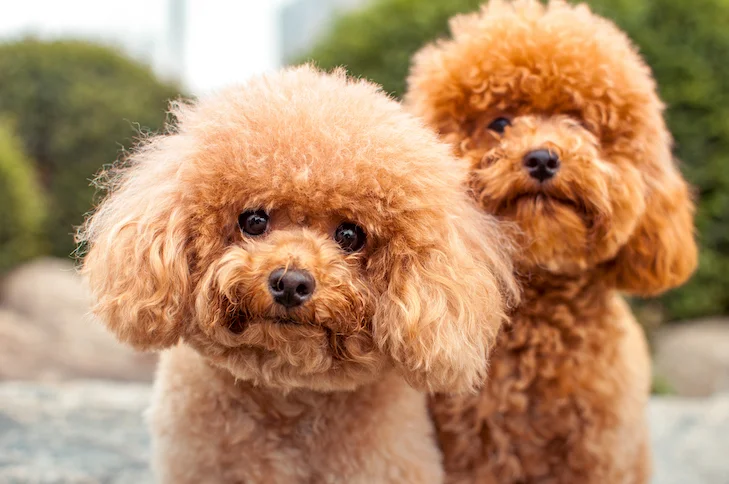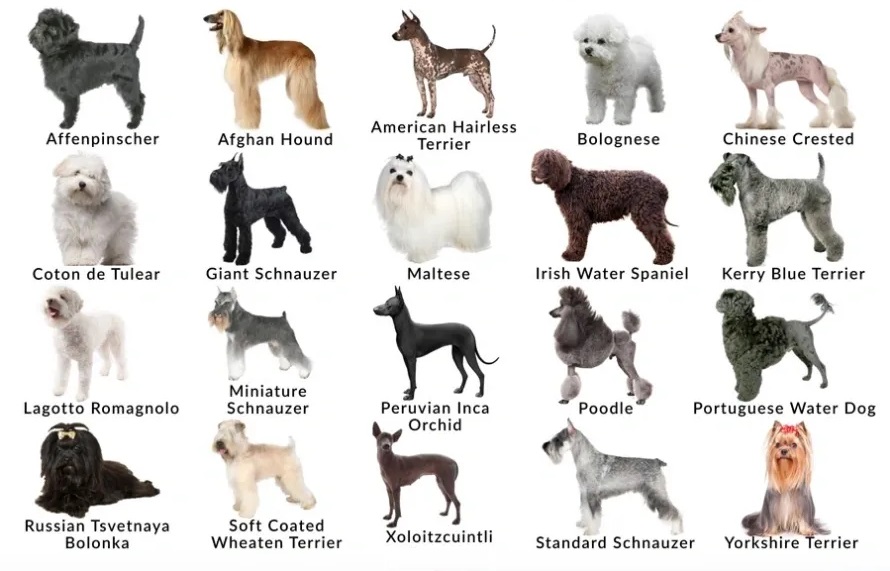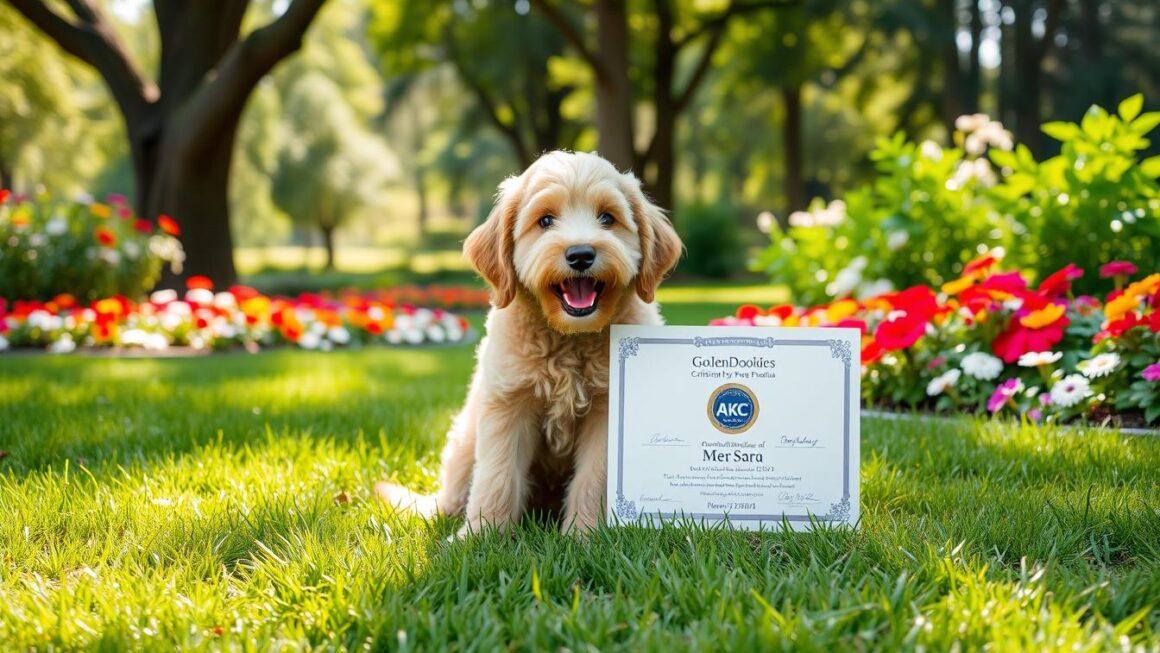If you’re among the millions who suffer from dog allergies, you might believe a life with a furry friend is out of reach. However, the term “hypoallergenic” often pops up in conversations about pet allergies, sparking hope for those affected. One breed frequently mentioned is the Goldendoodle. Marketed as an allergy-friendly option, many ask, “Are Goldendoodles hypoallergenic?” The answer could be more straightforward. Although no dog is truly hypoallergenic, Goldendoodles are often touted as less likely to trigger allergies. This article explores the characteristics that have earned Goldendoodles their reputation as a friendlier choice for allergy sufferers and examines the truth behind the claim.
What is a Hypoallergenic Dog?

The term “hypoallergenic dog” might conjure images of a perfect pet that causes no allergies at all, but the reality is a bit more complex. Hypoallergenic dogs are breeds or hybrids said to be less likely to trigger allergic reactions in humans. This designation primarily hinges on two factors: their propensity to shed less hair and their production of fewer allergens, such as dander and saliva.
A key feature of hypoallergenic dogs is their low-shedding coat. Breeds with this trait tend to release fewer allergens into their environment because the dander attached to the hair doesn’t disperse as widely when the dog doesn’t shed much. Furthermore, some hypoallergenic dogs produce less saliva or have saliva with different protein compositions, potentially reducing the likelihood of triggering an allergic response.
It’s crucial to understand that no dog breed is completely hypoallergenic. While certain breeds may cause fewer symptoms in some allergy sufferers, they can still produce allergens that might affect others. Therefore, when considering a hypoallergenic dog, it’s important to spend time with the breed to see if it triggers your allergies before committing to bring one home.
Also Read: Goldendoodle Vs Labradoodle: Which Is Better?
Are Goldendoodles Hypoallergenic?
When it comes to the question, “Are Goldendoodles hypoallergenic?” The answer requires a nuanced understanding of what hypoallergenic means in the context of dogs. Goldendoodles are frequently marketed as hypoallergenic. This claim is based on their partial Poodle heritage, a breed known for its low-shedding, curly coat that typically produces fewer allergens.
However, the hypoallergenic nature of a Goldendoodle isn’t a guarantee. Since Goldendoodles are a mixed breed, their coats can vary significantly, even within the same litter. The type of coat a Goldendoodle inherits can affect the amount of allergens the dog produces. Poodles have a tight, curly coat that tends to trap dander and hair, preventing it from becoming airborne, whereas Golden Retrievers have a straighter, denser coat that sheds more frequently and releases more allergens.
This mixed inheritance means that some Goldendoodles might inherit the Poodle’s hypoallergenic coat, while others may have a more like a Golden Retriever’s coat. Therefore, the degree to which Goldendoodles are hypoallergenic can depend heavily on their specific genetic makeup and how much they take after the Poodle versus the Golden Retriever.
Reasons Goldendoodles Are Often Seen as Allergy-Friendly
Goldendoodles are often considered to be allergy-friendly, but this perception is primarily rooted in their unique breeding. As hybrids of Golden Retrievers and Poodles, they can inherit the Poodle’s characteristic low-shedding, curly coat, which is touted for being less likely to spread allergens such as dander and saliva. However, the extent to which a Goldendoodle is allergy-friendly can vary greatly depending on the traits they inherit from each parent breed.
Many consider these dogs to be more compatible with allergy sufferers because of their coats. Poodles are known for their curly fur, which tends to trap dander—tiny flakes of skin that are a common allergen—rather than allowing it to spread around the home. When Goldendoodles inherit this type of coat, they shed less and thus disperse fewer allergens into their environment.
Also Read: How Much Do Goldendoodles Cost?
However, it’s important to note that dander production is not solely linked to shedding. All dogs produce dander and saliva, which contain the proteins that trigger allergic reactions in sensitive individuals. Therefore, while a Goldendoodle with a curly, Poodle-like coat may release less dander into the environment, it is not devoid of allergens. This aspect underscores why some Goldendoodles are considered more allergy-friendly rather than hypoallergenic.
Moreover, misconceptions about allergies often lead people to believe that they are allergic to the dog’s hair itself when, in reality, they are allergic to the proteins in the dog’s dander and saliva. Low-shedding breeds like the Goldendoodle might minimize the spread of these proteins, thereby reducing the likelihood of triggering an allergic reaction.
Other Allergy-Friendly Breeds

While Goldendoodles are often sought by those seeking an allergy-friendly dog, other breeds and hybrids are also known for their potential compatibility with allergy sufferers. These breeds typically share a low-shedding coat, which helps reduce the spread of allergens.
- Portuguese Water Dog – Known for their intelligence and non-shedding coats, these dogs are a favorite of allergy families.
- Schnauzer – Available in miniature, standard, and giant sizes, Schnauzers have a wiry coat that sheds very little.
- Bichon Frise – With a fluffy, curly coat that sheds minimally, Bichons are another popular choice for allergy sufferers.
- Maltese – Their long, luxurious coats are surprisingly low-shedding, making them suitable for those with allergies.
- Chinese Crested – Available in both a hairless variety and a powderpuff variety with hair, they produce minimal dander.
- Shih Tzu – Although they have a long, flowing coat, Shih Tzus shed less than many other breeds.
Each of these breeds, like Goldendoodles, varies in the individual level of allergens they produce, so exposure testing is still recommended.
Also Read: Top 7 Most Popular Dog Breeds 2024
Tips to Reduce Allergens in Your Home
Living with a pet while managing allergies can be challenging, but certain strategies can minimize allergens in your home:
- Maintain a Clean Environment: Regularly vacuum your home with a HEPA filter-equipped vacuum cleaner to effectively capture pet dander and other allergens.
- Establish Pet-Free Zones: Designate areas such as bedrooms as pet-free zones to ensure allergy sufferers can avoid prolonged exposure to allergens.
- Frequent Pet Baths and Grooming: Washing your pet regularly can help reduce the amount of dander and loose hair that can spread allergens. If possible, have a non-allergic family member handle the grooming.
- Upgrade Your Air Filtration: Use air purifiers with HEPA filters throughout your home to capture airborne allergens and improve air quality.
- Change and Clean Filters Regularly: Regularly change the filters in your air conditioning and heating systems to ensure they effectively remove particles from the air.
- Consider Allergy Treatments: Discuss possible treatments or medications with an allergist to manage your allergy symptoms more effectively.
By combining these strategies with careful dog breed selection, those with allergies can enjoy the companionship of a furry friend with fewer allergic reactions.
Final Thoughts
While Goldendoodles are often touted as hypoallergenic, it’s crucial to remember that no dog breed can be completely free of allergens. Their reputation for being less likely to trigger allergies stems from their partial Poodle heritage, which may endow them with a low-shedding coat. However, as a hybrid, their characteristics can vary significantly, even within the same litter. If you suffer from allergies, spending time with a specific Goldendoodle before committing is advisable to ensure your allergies are manageable. Consider the full scope of pet ownership, including the need for exercise, training, and financial responsibility, before bringing a Goldendoodle or any dog into your home. Making an informed decision is key to a happy life with your new furry friend.




